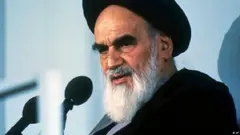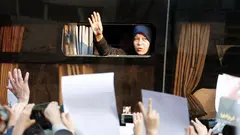Ali Akbar Hashemi Rafsanjani
All topics-
 Katajun Amirpur's "Khomeini" biography
Katajun Amirpur's "Khomeini" biographyKhomeini, the enigmatic Ayatollah
Recently published in German, Katajun Amirpur's new biography of Ayatollah Khomeini is a multi-faceted and knowledgeable portrait of the Iranian revolutionary leader that also offers some surprises. Marian Brehmer read the book for Qantara.de
-
 Iranian Faezeh Hashemi, Rafsanjani's daughter, speaks out
Iranian Faezeh Hashemi, Rafsanjani's daughter, speaks outWill the Islamic Republic ever get a female president?
Iran's social media was buzzing in January when, Faezeh Hashemi, daughter of Iran’s former President Rafsanjani gave a controversial interview, striking a chord with many Iranians. Questioning the merits of Tehran’s regional policy of "resistance" pursued by the late General Soleimani, Hashemi went on to assert that it will take sustained pressure to change the Islamic Republic’s policies. By Ali Fathollah-Nejad
-
 Neoliberalism and Iranʹs protest movement
Neoliberalism and Iranʹs protest movementIt's the economy, stupid!
The protests in Iran, like those elsewhere, express the populationʹs grave socio-economic concerns and discontent over the regimeʹs reform plans. Report by Iranian sociologist Amin Bozorgian
-
 Nepotism in Iran's Islamic Republic
Nepotism in Iran's Islamic RepublicAt home with the mullahs
In the Islamic Republic of Iran, which once vowed to eliminate hereditary rule, large family dynasties are increasingly dominating the political landscape. Critical voices assert that the Shah has been replaced by a clerical "king" as ruler of the country, complete with his own court and state nobility. However, some of the hereditary princes are demonstrating remarkable independence. By Ulrich von Schwerin
-
 Iranian-Saudi relations
Iranian-Saudi relationsFor better, for worse
The West often reduces the strained relations between Iran and Saudi Arabia to the sectarian Sunni-Shia conflict, but the reality is far more complex. By Joseph Croitoru
-
 Iran following the death of Rafsanjani
Iran following the death of RafsanjaniOn a knife edge
Now that Rafsanjani is gone, Iran's President Rouhani has lost his main advocate. In the impending conflict with US President Trump, Rouhani will have to manage without his mentor to keep the conservative hardliners in check, some of whom already see Trump's policies as confirming their distrust of the arch-enemy. By Ulrich von Schwerin
-
 Elections in Iran
Elections in IranEven Khomeini can be disqualified
The moderate cleric Hassan Khomeini has been excluded as a candidate for the Assembly of Experts in Iran, even though he is the grandson of the nation's founder. This example shows why it so difficult for the moderates and reformists to assert themselves against the country's conservative establishment. By Ulrich von Schwerin
-
 US–Iranian relations
US–Iranian relationsThe end of Iran's Islamic Revolution
The nuclear deal reached in July by Iran and its international interlocutors marks an obvious turning point in the Islamic Republic's relations with the outside world, particularly with the United States. But why has it taken so much longer for the US to come to terms with Ayatollah Ruhollah Khomeini's revolution in Iran than it did with Mao Zedong's revolution in China, asks Said Amir Arjomand
-
 Social justice and political reforms in Iran
Social justice and political reforms in IranA ticking time bomb
While the nuclear agreement with Iran may have opened the gates for oil exports and the import of European goods, the door to greater human rights, a pluralistic political party system and social justice in Iran remains firmly closed. Nevertheless, these central demands, which are made by large swathes of Iranian society, could soon come to the fore again. An analysis by Faraj Sarkohi
-
 One year on from Rouhani's election victory
One year on from Rouhani's election victorySurprise and disenchantment
A year on from his election victory, the Iranian president Hassan Rouhani has a success story to show for himself that barely anyone would have expected him to pull off: the breakthrough in the nuclear talks with the West. However, Iran's economic situation remains difficult and there have been few improvements in terms of freedom of speech and human rights. By Ulrich von Schwerin
-
 Iran and the Syria Conflict
Iran and the Syria ConflictPragmatism instead of Confrontation
Iran has welcomed the Russian imitative for international control of Syria's chemical weapon arsenal. The fact that President Obama is now pushing for a diplomatic solution to the conflict is also good news for the moderate forces in Tehran, who do not wish to support Assad at any price. By Marcus Michaelsen
-
 Interview with Bahman Nirumand
Interview with Bahman NirumandThe Pasdaran Holds the Reins of Power
Many consider the Pasdaran, Iran's Revolutionary Guards, to be the real centre of power in Iran. In this interview with Shahram Ahadi, Bahman Nirumand talks about how the role of the Pasdaran in the Islamic Republic has changed in recent years and its possible influence on the presidential election